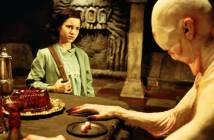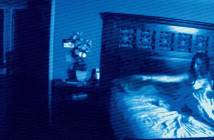It can’t be successfully argued that the “found-footage” genre of horror movies is a big, fat bubble ready to burst when there are examples of excellent moviemaking like The Atticus Institute out there. The Atticus Institute is so good, in fact, that its appeal reaches beyond horror fans — it’s a marvelous example of cinematic storytelling that nurtures its pacing without flaw.
The Atticus Institute isn’t just found footage written and directed by Chris Sparling — it’s a “mockumentary” in which unknown moviemakers compile now-public records of the government’s only acknowledged case of demonic possession, all of which occurred at the fictional Atticus Institute, a research facility specialized in uncovering supernatural abilities in humans. I couldn’t help but think about the Ghostbusters scene where Bill Murray’s Peter Venkman character is conducting the Zener card test for telepathy (one person holds up a card, and the potential psychic has to guess what symbol in on the back of the card). But Ghostbusters is a comedy, and there’s nothing funny in The Atticus Institute.
Heading the institute is Dr. Henry West (played by William Mapother): he’s a man who doesn’t let anything get in the way of his work. He’s determined to prove the existence of paranormal phenomena and humankind’s ability to harness it. His motivator is Nina Kulagina, a Russian woman who claimed to have psychic powers, specifically telekinesis. The film shows what I assume to be real Soviet footage of the woman demonstrating her psychic powers. West wants to find a Nina of his very own, and he originally thinks it’s Darrell Price (Lou Beatty Jr.); he’s skilled at performing parlor tricks like tapping around cornflakes in a bowl of milk with his mind. But it was later proven to be a hoax due to magnetism emitted from a watch. West was crushed — until Judith Winstead is admitted to the facility.
The introduction of Judith (Rya Kihlstedt) leaves you guessing from the moment you meet this quiet, conservative-looking woman: what exactly is her deal? She wears simple housedresses and sweaters, her dark hair is neat and short, and she’s quiet… very quiet. But for a woman of few words her performance is the loudest and most dramatic of all the actors in the film. Judith’s large, almond-shaped eyes stare at you and pierce through your core; the looks she gives the camera are far more striking than any scripted dialogue. And the longer she stares, the greater your uneasiness grows. We know little of her throughout the film, save for a brief interview from her sister, which is set in the present day. She was a quiet child, but was always distracted. And the older she became, the more her temperament changed.
Here is where the film’s paced storytelling shows its stuff, because West and his colleagues are certain they’ve found their Nina Kulagina. In the beginning it’s simple manifestations from Judith: a filing cabinet slowly opening, the corner of a Zener card bending. But the more Judith is pushed the further the woman is driven away, and something else takes shape.
It’s no great spoiler that Judith’s psychic powers are not some product of human evolution, but rather the manifestation of something dark living inside and controlling her. It’s assumed to be a demon, as The Exorcist has led us to always assume. And the maliciousness of the entity is where Judith’s powers are most frightening. After she is officially labeled as dangerous, a government team led by Robert Koep (Julian Acosta) is called in to take control of the situation. And control turns into figuring out a plan to weaponize the monster living inside Judith. And all the while, West, the passionate scientist and loving family man, grows moody and removed. Modern-day interviews with his family reveal the deterioration of a once lively man (and a surprise performance from Bear City star Gerald McCullouch as West’s son; I didn’t recognize him at first).
The Atticus Institute doesn’t rely on jump-scares too creep you out: the atmospheric sense of dread and epistolary knowledge that we probably shouldn’t be watching the film is what will chill you. One of my favorite examples of this involves no special effect as all — just good acting. A telepathy exam with West, Koep, and Susan Gorman (Sharon Maughan and Hanna Cowley) tests how far into the human mind Judith can probe. The thought she’s supposed to find is simply a hammer. The thought she pulls out is far deeper and far more personal for Gorman. Another instance involves Lawrence Henault (Harry Groener and Ilya Pikus) and nothing more than a simple paperclip.
As I mentioned before, The Atticus Institute takes cues from The Exorcist, but they’re respectful nods and not cheap imitations. The fear that this film calls up is not shock value, but an ever-growing sense of dread. This is summed up best by an interview with a retired policeman (Michael Delia): “You don’t get to play games with the devil, and if you do you damn sure don’t get to make the rules. That type of evil, just thinking about it, talking about it, even you people making this movie, and the people watching it — you’re inviting bad thing into your life. Too late for me… all the things I’ve seen.”
I highly recommend The Atticus Institute.



